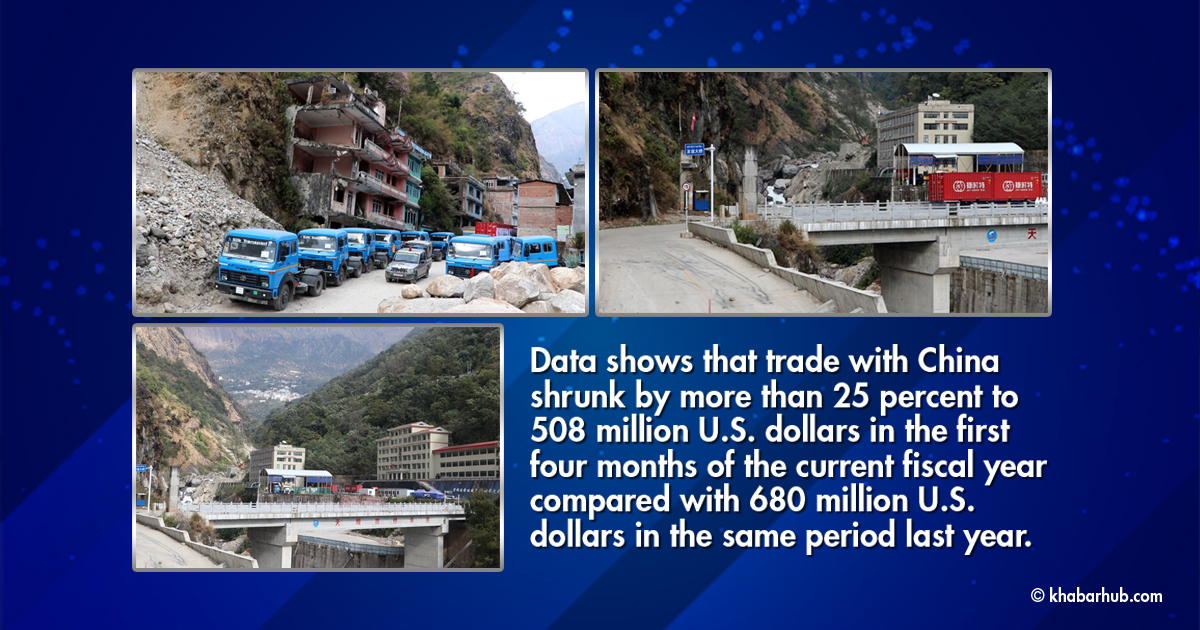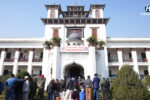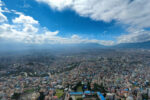SINDHUPALCHOWK: The then government led by KP Oli formed after the promulgation of the new Constitution in Nepal took special initiatives to open the northern border.
Accordingly, a transit agreement was signed between Nepal and China to allow the import and export of goods from third countries through Chinese ports.
It was then announced that Nepal would be transformed from a landlocked to a “land-linked” country.
Chinese President Xi Jinping, who visited Nepal last year, also announced that Nepal would become a ‘land-linked’ country.
However, in reality, this does not seem to be the case. Forget about importing goods from third countries, it has not been easy for Nepal to import goods from the bordering Chinese market.
It should be recalled that a transit agreement was signed between Nepal and China on March 21, 2016.
Nepal was then expected to be able to exercise its right of transit through Chinese territory and help increase Nepal’s exports.
Meanwhile, the transit protocol was signed on April 29, 2019, during President Bidhya Devi Bhandari’s state visit to China to implement the agreement.
As mentioned in Article 15 of the Protocol, the agreement had to be implemented exactly one month after each country informed the other for its enforcement.
According to the exchange of information on internal preparations, even though China provided the information with some delay, even though the protocol has to be implemented from February 1 this year, Nepal has not been able to reap the benefits so far.
VIDEO
China had, according to the protocol, allowed Nepal to use four open seaports and three open dry ports.
The seaports approved by Nepal are Shenzhen, Tianjin, Zhanjiang and Lianyungang, while the dry ports are Lhasa, Lanzhou and Shigatse.
Nepal has six border ports in China for transit. Although Nepal has access to Rasuwa-Jilong, Kodari-Jangmu, Kimathangka-Chhentang, Nechung-Liji, Yari-Pulan and Olangchungola-Riu ports, it has not been formally used.
However, though import and export are done only through Rasuwa and Tatopani checkpoints, it has also been obstructed.
As per the agreement, Nepali vehicles can travel up to Shigatse for transit with the permission of Chinese authorities.

The agreement also stipulates that Nepal will be able to use Chinese railways, ports, inland waterways, and other modes of transportation besides roads.
Tatopani border point in a dreadful situation
The Tatopani border point in Sindhupalchowk district, which was the major entry point until the devastating earthquake of 2015, is currently in disrepair.
Despite the official announcement of the opening of the border point, it seems to have come to a standstill due to insufficient supplies from China.
Officials say the Chinese side has not allowed people to enter saying that their preparations were not complete.

Series of obstruction at Tatopani border
The government officials, customs administrations and businessmen are fed up with the series of troubles they have been facing from the Chinese sides at the Chinese ports since January this year.
What’s more, in the meantime, the Tatopani checkpoint has been closed and reopened now and then, often without enough reason and consultation with the Nepali side.

The checkpoint shut down after the 2015 Earthquake was reopened on May 29, 2019, more than four years long diplomatic efforts.
It was closed again on January 27 this year. The checkpoint was opened unilaterally on April 9.
But before it could come into normal operation, citing the explosion of Chinese glacial lake it was closed again in the third week of June.
After that, the checkpoint was reopened on October 16, but this time too, it did not go ahead much long as it got closed immediately citing a staff tested coronavirus positive.
After persistent efforts, the checkpoint has been open again since October 29 but the transaction from there is almost to nothing.
Hardly, 8 to 10 containers enter Nepal daily from the two checkpoints.
However, the Ministry of Foreign Affairs has remain silent mysteriously on the issue.
“We took diplomatic initiative to open Tatopani and Rasuwa border with China.” Sewa Lamsal, the spokesperson at the Ministry of Foreign Affairs told Khabarhub.
“Accordingly, the goods started arriving from the checkpoint, but we do not know about the quantity of the goods and supplies that entered from there,” Lamsal said.
Geopolitical analyst, Arun Kumar Subedi thinks China has opened Rasuwa and Tatopani border only for its strategic use.
Despite its proclamation about opening the borders with Nepal, sending sporadic goods from the border indicates that it has opened its border only to use Nepal strategically.”
Subedi further said that China is using the checkpoint to reach the border area easily. He also pointed out that the current shortage could be due to the post-October weather and the topography.
Nepal’s trade with China declines by over 25 percent
Nepal’s trade with its northern neighbor China has declined by over 25 percent in the last four months of the current fiscal year.
According to the Department of Customs, trade with China decreased on a year-on-year basis during the first four months of the current fiscal year 2020-21 amid the coronavirus pandemic.
The data shows that trade with China shrunk by more than 25 percent to 508 million U.S. dollars in the first four months of the current fiscal year compared with 680 million U.S. dollars in the same period last year.
Nepal’s imports declined by some 10.62 percent to 3.38 billion U.S. dollars in the last four months due to the coronavirus pandemic, the data shows.

One of the reasons for this is because China halted Nepali goods at the Rashuwagadhi-Kerung and Tatopani border points in the pretext of the coronavirus pandemic.
However, the Chinese side has allowed around four to five trucks to enter Nepal from the Rasuwagadhi-Kerung border point and around the same number from the Tatopani border point.
Nepal imports items such as machinery, mobile phones, readymade garments, electrical items, and chemical fertilizers.
Export nil, import sporadic
Though allowing sporadic import, China has halted land exports from Nepal for almost a year now. Nepal’s exports from the northern border came to standstill due to Chinese one-way operation citing the coronavirus pandemic transmission risks.
Tatopani checkpoint has not seen any export since October whereas there has been no export from Rasuwa since last January.
The import is sporadic only as well. As of January of the last fiscal year, Nepal had exported goods worth Rs. 582.3 million through Rasuwa.
After that, there is zero export even from Tatopani checkpoint. Despite Nepal’s earnest requests through different platforms for two-way operation of the border, China has been deterring, citing coronavirus pandemic transmission risk.
Around Rs 2 billion trade deficit in a year
According to the Department of Customs, Chinese checkpoints account for 0.74 percent of the total exports from Nepal, while the share of total imports through the border points is 3.01 percent.
Nepal imported goods worth Rs. 181.92 billion from China and exported goods worth Rs. 1.19 billion in the Fiscal Year 2019/2020.
During this period, Nepal incurred a total trade deficit of Rs. 180.72 billion. In the same fiscal year, goods worth Rs. 36.18 billion entered Nepal through Chinese checkpoints.
Out of this, goods worth Rs 26.64 billion were imported from Rasuwa and worth Rs 9.53 billion from Tatopani.
Meanwhile, Lal Bahadur Khatri, Chief of the Tatopani Customs Office said goods to Nepal are entering sporadically.
“Currently, four to eight Chinese trucks are coming daily. Until a few days ago, only three to four vehicles used to come daily,” he told Khabarhub.
According to him, Nepali laborers have been unemployed because of this.
It should be noted that China had barred goods from entering Nepal for almost a year.
Nepal’s exports from China had earlier come to a standstill due to China’s one-way operation citing the COVID-19 pandemic.
No imports were witnessed from the Sundhupalchowk’s Tatopani border point since last October and the Rasuwa checkpoint since last January.
Nepal has been importing goods from China through the Rasuwa and Tatopani. However, the trade volume has declined due to several holdups.
It may be recalled that Nepal and China had signed the transit protocol in Beijing on April 29 last year during President Bidya Devi Bhandari’s visit to China.

Meanwhile, Prime Minister KP Oli had signed the Transit and Transportation Agreement aimed at breaking Nepal’s dependence on India for third-country trade during his visit to China in 2016.
The transit protocol permits Nepal’s access to seven Chinese seas and land ports for third-country trade.
Meanwhile, according to the data of the Fiscal Year 2075-67 BS made available by the Customs Department, India’s share in Nepal’s total imports is 64.71 percent, and in total exports, it is 64.40 percent.
Apart from India, Nepal has more than 35 percent of the world’s trade out of which China’s share in total imports accounts for 14.49 percent and total exports at 2.17 percent.









Comment